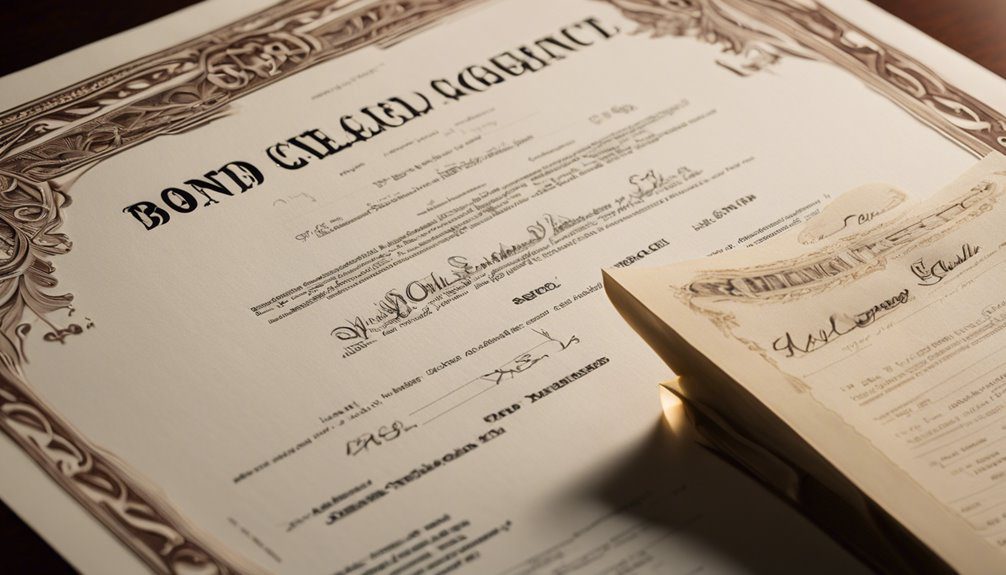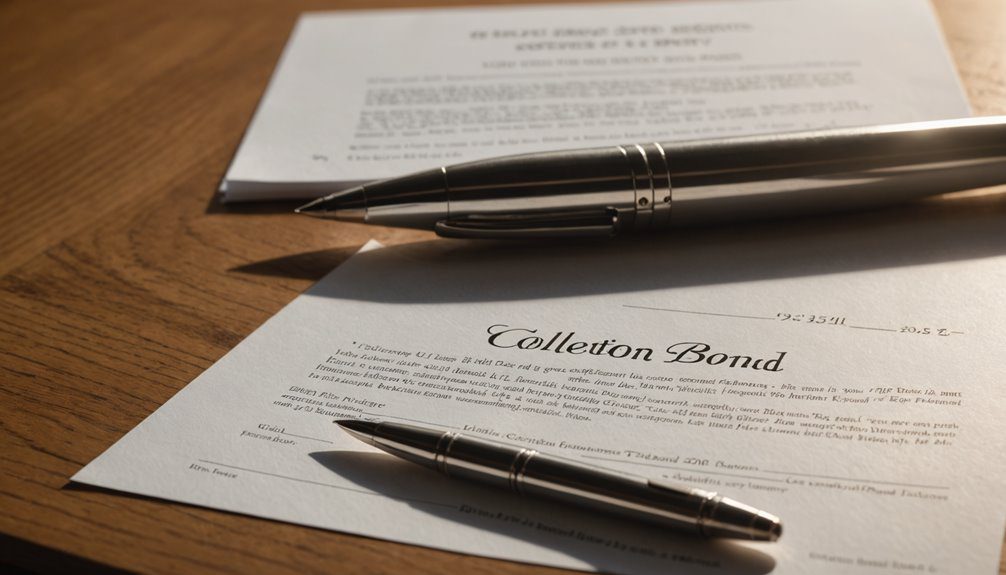If you're considering starting a collection agency in Utah, you need to understand the significance of the Utah Collection Agency Bond. This bond isn't just a regulatory formality; it's a vital component that underpins your agency's credibility and ethical standing in the industry. With bond amounts ranging from $10,000 to $100,000, you might be wondering what these figures mean for your business operations and reputation. Let's explore the crucial aspects of this bond that could impact your success in ways you might not expect.
What Is a Collection Agency Bond?

A collection agency bond is a type of surety bond that ensures a collection agency operates legally and ethically. This bond serves as a protection mechanism for clients and the public, guaranteeing that the agency will adhere to state regulations and industry standards.
When you engage with a collection agency that holds a valid bond, you're essentially ensuring that they're financially accountable for their actions.
In the event that the agency violates any laws or regulations, you can file a claim against the bond. This process allows you to recover losses due to misconduct, such as fraud or unethical practices. The bond amount typically varies depending on the state's requirements, and it reflects the agency's commitment to responsible operations.
Obtaining a collection agency bond requires the agency to undergo a thorough vetting process, which often includes credit checks and background investigations. This ensures that only trustworthy agencies can secure a bond, giving you peace of mind when choosing a collection service. Additionally, compliance with bonding requirements enhances the agency's credibility and trust with clients and debtors.
Importance of the Bond
Understanding the importance of a collection agency bond can significantly impact your experience with debt recovery services. This bond acts as a safeguard, ensuring that the agency adheres to ethical practices and maintains compliance with state regulations.
When you choose a bonded collection agency, you're engaging with a company that's committed to protecting your interests as well as those of your debtors.
A collection agency bond provides you with peace of mind, knowing that the agency has the financial backing to cover any potential damages or misconduct. If the agency fails to fulfill its obligations, you have a pathway to seek compensation, which can be crucial in restoring your financial standing.
Moreover, working with a bonded agency can enhance your credibility. Clients and debtors alike may feel more comfortable knowing that the agency is licensed and bonded, which can lead to better collaboration and smoother negotiations.
In a competitive market, this trust can set you apart from others who don't prioritize compliance and professionalism. Ultimately, the importance of a collection agency bond lies in its ability to foster trust, accountability, and a more effective debt recovery process for everyone involved. Additionally, the bond requirements ensure that agencies are financially stable and uphold ethical standards, reflecting the overall industry commitment to consumer protection.
Legal Requirements in Utah

In Utah, specific legal requirements govern collection agencies that must be met to operate legally.
First, you need to register your collection agency with the state. This involves submitting an application to the Utah Division of Corporations and Commercial Code, along with the necessary fees. You'll also need to provide proof that you have a physical office in Utah.
Next, obtaining a surety bond is crucial. This bond acts as a financial guarantee that you'll comply with state regulations while conducting business. The required bond amount varies, so make sure you check the latest requirements to avoid any surprises. Additionally, the bond provides protection against financial loss due to non-compliance, which is a key aspect of ensuring your agency operates within legal boundaries.
Additionally, you must comply with the Fair Debt Collection Practices Act (FDCPA) and other consumer protection laws. This means you should train your employees on ethical collection practices, ensuring they understand the legal boundaries when dealing with consumers.
How to Obtain a Bond
Obtaining a bond for your collection agency in Utah is a straightforward process, but it requires attention to detail.
First, you'll need to research and choose a reputable bonding company. Look for companies that specialize in collection agency bonds, as they'll be more familiar with the specific requirements in Utah.
Next, gather the necessary documentation. This typically includes your business license, financial statements, and any other information the bonding company may request.
Be prepared to provide personal information, as your credit history can influence the bonding process.
Once you've selected a bonding company and collected your documents, you can submit your application. The bonding company will review your information and assess your qualifications.
They may conduct a credit check and evaluate your financial stability.
After approval, you'll receive your bond, which you'll need to file with the appropriate state authorities.
Make sure to keep a copy for your records.
Finally, be aware of any renewal requirements, as bonds usually have a set term and need to be renewed periodically.
Following these steps will help ensure you successfully obtain your collection agency bond in Utah.
Bond Amounts and Cost

Bond amounts for collection agencies in Utah can vary significantly based on several factors, including the size of your agency and the volume of debts you handle.
Typically, the required bond amount ranges from $10,000 to $100,000. If you're a small agency just starting, you might find that the lower bond amounts are more manageable. However, larger agencies dealing with higher volumes of debt may need to secure a more substantial bond to meet state requirements.
The cost of obtaining the bond usually falls between 1% and 10% of the total bond amount. This means if your bond is set at $50,000, you could pay anywhere from $500 to $5,000 annually.
Your credit score and the financial stability of your agency will also influence the premium. Insurers often assess these factors to determine your risk level and, consequently, your bond cost.
Responsibilities of Bondholders
As a bondholder, you're responsible for ensuring that your collection agency operates within the law and adheres to ethical practices. This means you must actively monitor the agency's activities, making sure they're compliant with state regulations and industry standards. Your oversight helps protect consumers and maintains the integrity of the collection process.
You'll need to stay informed about the latest laws and regulations affecting collection agencies in Utah. This knowledge empowers you to identify any potential violations or unethical conduct. If issues arise, it's crucial to address them promptly, as failure to do so could lead to financial penalties or the loss of your bond.
Additionally, you should encourage transparency within the agency. Providing clear communication channels for both clients and consumers can help resolve disputes and foster trust.
You'll also want to ensure your agency has proper training programs in place for employees, emphasizing ethical collection practices and customer service.
Common Misconceptions

Many people have misconceptions about what a Utah collection agency bond actually entails. One common belief is that the bond guarantees the agency will collect debts successfully. In reality, the bond serves as a form of insurance, ensuring that the agency complies with state regulations and acts ethically. If the agency violates these rules, the bond can provide financial compensation to affected parties.
Another misconception is that obtaining a bond is a quick and easy process. While it may seem straightforward, you'll need to meet specific requirements set by the state and the bonding company, which can take time and effort.
Some assume the bond is a one-time fee, but it's an ongoing responsibility. You'll need to maintain the bond by paying annual premiums, which can fluctuate based on your agency's performance and risk factors. Additionally, immigration consultant bonds demonstrate the importance of accountability in the consulting field, reflecting the need for ethical practices across various service industries.
Bond Renewal Process
Renewing your Utah collection agency bond is a crucial step in maintaining compliance with state regulations. The renewal process typically begins a few months before your current bond expires. It's essential to stay ahead of deadlines to avoid any lapses in coverage, which could lead to penalties or disruptions in your business operations.
First, check your bond's expiration date and review any requirements set forth by the state. You'll need to provide updated information about your agency, including any changes in ownership or financial status.
Next, reach out to your bonding company to discuss the renewal process. They may require a re-evaluation of your qualifications, including your financial stability and business practices.
Once you've submitted the necessary documents, the bonding company will assess your application. If everything checks out, they'll issue a new bond.
Don't forget to file the renewed bond with the appropriate state authorities to ensure your compliance.
Lastly, keep a record of your renewed bond and any related documents for your records. Staying organized will help streamline future renewals and keep your collection agency running smoothly.
Impact on Business Reputation

Maintaining a valid Utah collection agency bond significantly impacts your business reputation. When clients see that you're bonded, it signals professionalism and reliability. This bond serves as a financial safety net, reassuring your clients that they're protected against potential misconduct. If a dispute arises, your bond offers them a layer of security, which can enhance their trust in your services.
Conversely, failing to maintain this bond can lead to serious reputational damage. Clients may hesitate to work with you, fearing that your lack of bonding reflects poor business practices. Word spreads quickly in the business world, and negative perceptions can deter potential clients from choosing your agency.
Moreover, a valid bond can set you apart from competitors who may not prioritize compliance. It shows you're committed to ethical practices and the well-being of your clients. By investing in your bond, you're investing in your reputation. Additionally, obtaining a surety bond is essential for maintaining regulatory standards, which further underscores your agency's commitment to ethical operations.
In today's competitive market, a solid reputation is invaluable. Keep your bond active, and you'll not only protect your business but also foster trust and confidence among your clients, ultimately leading to greater success for your agency.
Conclusion
In conclusion, securing a Utah Collection Agency Bond is vital for your business's success and reputation. It not only ensures compliance with state regulations but also builds trust with your clients. By understanding the bond's requirements and maintaining it, you'll enhance your credibility in the competitive debt recovery market. Don't underestimate the importance of this bond—it's a key step in demonstrating your commitment to ethical and responsible business practices.

